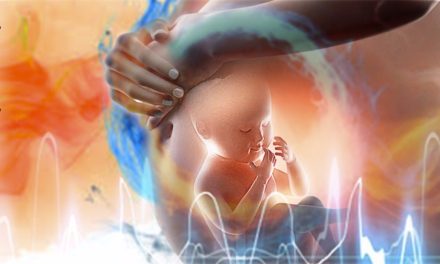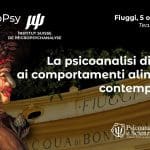Kind friends,
When I was asked to give my contribution to this interesting conference dedicated to the celiac disease I had a moment of perplexity. In effect, a real specificness of the psychological components connected to the celiac illness does not exist: at the moment we have no evident proof of a possible direct link between celiac disease and mental illness even within the presence of clinical cases which signal this association.
But when I pondered that the symptoms of diseases reactivate functions and traumas deposited in the psychic memory, I realized that I would have been able to give a contribution, I hope important, to this work.

I have recently participated in two very important international congresses dedicated to the intrauterine psychic life and I can affirm that it is of unanimous opinion that the intrauterine psychosomatic events leave most evident traces of memory in the human psychicism, events that will influence the psychobiologic destiny.
Some may say, speaking about the psychic problems connected to celiac disease, “But in the end we are only talking about the intestine!”. Let’s take a look at just some curiosities:
1. Our intestine, sterile during the intrauterine life, becomes colonised tumultuously at birth by bacteria. The role of these saprophytes reserves many surprises: they are necessary for the digestion and represent the first ambassadors of the external world. They are more numerous than the cells in our body and they are thousands of thousands of millions: therefore it doesn’t surprise us to know that the maximum distribution of our immune system (approximately 70% of the cells), in charge of the conservation of our integrity and immune biological uniqueness, is concentrated in the intestine. Our intestine is the largest part of the body to have contact with the external world: “Internally we are hollow” says Michael D. Gershon, neuroscientist of Columbia University in New York “the body comes into contact with the external world not only by means of the skin but also through the intestinal walls. A tunnel so well made to allow the surrounding environment to pass through us without causing any damage”.1

But serotonin is not the only substance secreted by the abdominal brain: it produces about forty neuromediators through which it communicates with the Central Nervous System. The cells of both brains, in fact, speak the same chemical language. This explains why in those suffering from Alzheimer’s and Parkinson’s, often the same type of anatomic lesions can be found in both brains and why the psychiatric medicines have effect on the intestine and the gastroenteric ones have effect on the brain! A gastric hormone, the secretin, is at the present time being experimented in the therapy of autism. An anti-migraine medicine sedates the hyperactive intestines. The painkillers calm some inflammations of the digestive tract and some antidepressants have effect on the cerebral mood, but also on the abdominal brain causing diarrhoea or constipation.
3. From a physiological point of view, not for anything, our small intestine has 400 m2 of exchange surface! As S. Fanti reminds us: “… They can resect the stomach and the large intestine almost in totality, resect a part of the brain, the eyes, a lung, a kidney (or even both), both arms and legs and we can survive. But if they resect too much of the small intestine we will die”. 2
Now lets look at the psychodynamic part of my brief contribution. The first thing that we must try to clarify is the psychic dynamic that establishes itself when, for various reasons, the prohibition or the delay of feeding in the child is necessary.
In the breastfeeding baby the innate need of nutrition, the sucking reflex and the grasp reflex exist: all these things lead us to believe that there are instinctual activities which, in a manner of speaking, “push” the baby towards the grasp and eat activity, in a undifferentiated way.
It seems that it is actually the enteric brain, which coordinates and promotes these strategic innate functions.
The baby grasps something (for example the maternal breast), taking it to its mouth, it feeds itself, the need placates and the tension within the mental system nullifies itself. But on a psychic level the pressure-information to grasp remains: it is nice to grasp. Even when the feeling of satiety has taken place, the baby exerts the grasping and sucking activity, since evidently, such an activity is sustained by the pleasure principle.

The ideational representative of the inhibited action is blocked immediately but it continues to be fuelled by the energy drive: in this way a first unconscious nucleus is created which functions as an agglutinant nucleus, a kind of magnet, towards similar elements to be removed. If the action of grasping and eating cannot be exerted not only is it not performed, but also the inhibition itself of “thinking of doing it”, takes place. But that desire has, however, been activated, it cannot be cancelled, it remains in the unconscious and becomes the source of the instinct itself, since the drive cathexis remains connected to it. The desire has not reached the consciousness and it has not been transformed into an action, since an inhibitory anticathexis has been generated which has blocked it on the spot.
It is on this point to which I would like to call your attention: so that a drive impulsion, an unconscious desire can remain thus, a continuous uninterrupted cathect which maintains the representation of what one wanted to do “on the spot”, in other words outside the field of awareness, is necessary.
To explain this concept Freud used a very efficient example, which I will give to you. Imagine that at this moment, whilst I am speaking, a disturber enters this room shouting at the top of his voice and interrupts our session. We should make him leave and close the door. But lets suppose that the subject is particularly obstinate, an obsessed man who can’t do anything else but enter and shout: the only useful solution for us to continue our work would be for three or four of you, possibly the strongest, after having thrown out the disturber again, to close the door and continuously exert your force, with a continuous dispersion of energy, to keep it closed.
This is how the life of a neurotic is: a continuous dissipation of vital energy in the attempt of keeping the doors of access tightly closed to his infantile desires incompatible with the conscious Ego. It is for this reason that neurotics complain of a continuous asthenia, also in conditions of complete psycho-physical rest.
Now we can return to our breastfed baby, which wanted to grasp and devour his mother’s breast.
The desire has been inhibited but the energetic activity of the primary process loads it continuously, it has become the source of the instinct: it is continuously waiting to be satisfied. If its cathexis is strong enough, it will deform the ego defences, managing in one-way or another to show itself: this is the symptom, a compromise between the achievement of the primal instinctual pressure and the mechanisms of defence. To remain with the example used, the adult, heir of that child, will not become a cannibal, but he might devour his own nails in a compulsive manner, using the defensive mechanism of the introjection of the aggressiveness.
This person will devour his nails to the flesh, without even knowing it and without having any possibility of avoiding it. It’s clear that when we find ourselves in a situation similar to that of the celiac patient in which, above all, at the initial stage of treatment, one must renounce or substitute certain foods, previous phases of so called infantile traumatic fixations can be reactivated connected to the nutritional events, and in each of our lives, even in normal subjects, not by chance defined as normal-neurotics, there are traumatic events memorized, more or less elaborated.
Therefore, the initial necessary modification of eating habits reinvests the unconscious traces of the previous traumatic experiences determining a brusque reactivation of the oral aggressiveness and a possible diversion in the somatic compartment, determining a pathological feedback and a consequential possible reinforcement of the pathological situation.

Certain studies in merit tend to link such disturbances with the reduction of the metabolism of monoamines (serotonin above all), responsible for the mood level, at the Central Nervous System level. The improvement of the mood level and mental activities after a period of a gluten-free diet confirms these results. 3
While the compliance with a gluten-free diet does not involve particular resistances from the child during the first infancy, due to the passive adaptation of the child to the maternal-foetal symbiosis and to its rules (in other words the child adapts itself passively to the nutritional programmes proposed by its parents) on the other hand the adolescence is a delicate period for the celiac patient. It is in this delicate period in which the prepuberal subject begins the separation from the objects upon which he had invested his libido: the critical behaviour, that we all recognize, begins to manifest itself towards the parental figures and the interest and the interaction towards subjects of the same age increases, in the search of one’s own identity.
It’s typical of the adolescent age to question the values and the rules previously laid down, through the use of an initiatory new language, the juvenile lexicon and with oppositional behaviour, which is often compulsive. It is the eternal Oedipus opposition! But the pressure to differ from the family group is also expressed in the eating habits: it is sufficient to think of the totem function of the chewing gum in the ’60s or that of the fast food in the ’80s. For the reasons given above, Doctor Nadia Daffinà reminds us: “ …It is easy to understand how the adolescent with celiac disease can manifest a refusal of his own illness and a scarce compliance with his diet more than in any other phases of life. Furthermore, it is best to bear in mind how the very strictness of the gluten-free diet can facilitate the behaviour mentioned above”. 4 In a study of 39 children and adolescents suffering from celiac disease all on a gluten-free diet for many years Cinguetti 5 has evaluated (with a clinical questionnaire) the emotional and behavioural discomfort. The results show how the feeling of discomfort and diversity, referred to the diet, was more or less absent within the family, while on the other hand, it had a considerable importance in the social aspect when with friends.
Another psychic aspect, which I would like to refer to, is the unconscious modality with which both mother and child live each aspect of diversity. A mechanism exists within the unconscious, named as the Omnipotence of Thought, for which the child, with the aim to regain an active role in respect to the traumatic experiences, puts himself at the centre of the events of the world, structuring the experience that everything that happens comes from him. Therefore, it is easy to understand how this phenomenon can structure feelings of guilt connected to the recognition of the real state of health. A parallel phenomenon can structure itself in the mother’s mind, who, being the bearer of the child, can have a profound sense of guilt: unfortunately the unconscious doesn’t recognize the etiopathogenesis of the illnesses.
The brief amount of time available brings me to the conclusion: we have seen how deep the connection between the psychicism and gastrointestinal physiopathology is. A group psychotherapeutic counselling could be of valuable help to familiarize oneself to such inevitable conflicts of adjustment and allow a satisfactory elaboration.
Written by: Quirino Zangrilli © Copyright
Translated by Linda De Nardo
videographics by Luca Zangrilli © Copyright
Key words
celiac disease
enteric nervous system
oral stage
Counseling
Summary
When we find ourselves in a situation similar to that of the celiac patient in which, above all, at the initial stage of treatment, one must renounce or substitute certain foods, previous phases of so called infantile traumatic fixations can be reactivated connected to the nutritional events. Therefore the initial necessary modification of eating habits reinvests the unconscious traces of the previous traumatic experiences determining a brusque reactivation of the oral aggressiveness and a possible diversion in the somatic compartment, determining a pathological feedback and a consequential possible reinforcement of the pathological situation.
Notes:
1 Michael D. Gershon, Il secondo cervello, UTET, 2006.
2 Silvio Fanti, La Micropsicoanalisi, Borla, Roma, 1983.
3 ( Hernanz A., Polanco I.: <>. Gut, 1991, 32, 1478-1481.; Hallert C., Granno C., Grant C., Hulten S., Midhagen G., Strom M., Svensson H., Valdimarsson T. & Wickstrom T.: <>. Scand. J. Gastroenterol. 1998; 33: 933-938.).
4 Nadia Daffinà, Problematiche emotivo-comportamentali secondarie alla malattia celiaca, 2002.
5 Cinquetti m., Micelli S., Zoppi G.: <>. Ped. Med. Chir. (Med. Surg. Ped.), 1997, 19: 397-399.
An abstract taken from the report presented at the Study Day for Celiac Disease organized by AIC of Frosinone, the 20th December 2008.
Nel 2024 riceve il Premio Accademico d’Onore della Accademia Culturale Internazionale Cartagine 2.0.
Doctor Quirino Zangrilli was born in Fiuggi in 1955. Graduated with honours in Medicine and Surgery in 1980, he practices Psychoanalysis, with intensive method, since 1982. He is author of 72 scientific pubblications. He has attended as speaker or president of session to many national and international scientific Conventions. His book “La vita:involucro vuoto” (Life: empty involucre), published by Borla in 1993, has been in use by the Chair of Dynamic Psychology at Turin’s University since 1994. He is the author and founder of the multimedia review “Psicoanalisi e Scienza” (Psychoanalysis and Science), the most read Italian on line review of psychoanalysis. In 2012 he participated as a Speaker at the Scientific Festival of BergamoScienza. In 2013 he illustrated his research on the maternal-fetal interaction in the Special Session of the XI World Congress of Perinatal Medicine in Moscow with his relation “Intrauterine Imprinting”. He is visiting teacher at Moscow Institute of psychoanalysis and training psychoanalist of Swiss Institute of Micropsychoanalysis.
In 2024 he received the Honorary Academic Award of the Carthage 2.0 International Cultural Academy
Le Le Docteur Quirino Zangrilli est né à Fiuggi en 1955. Diplômé avec mention en Médecine et Chirurgie en 1980, il pratique la psychanalyse depuis 1982, en utilisant une technique intensive. Il est l’auteur de 72 livres et publications scientifiques. Il a participé en tant que conférencier ou président de session à de nombreuses conférences scientifiques nationales et internationales. Son livre “La vie : enveloppe vide”, publié par Borla en 1993, est adopté depuis 1994 par la Chaire de Psychologie Dynamique de l’Université de Turin. En 1994, il a reçu le “Prix national Ciociaria de médecine”. Il a conçu et fondé le magazine multimédia “Psicoanalisi e Scienza”, qui est le magazine de psychanalyse en ligne en italien le plus suivi au monde. (Source : Entireweb, Alexa, Google, Virgilio, Arianna., etc.). En 2012, il a participé en tant que conférencier à la colloque scientifique de BergamoScienza. En 2013, il a exposé ses études sur l’interaction materno-fœtale lors de la session spéciale du XIe Congrès mondial de médecine périnatale à Moscou avec le rapport “Intrauterine Imprinting”. Il est chargé d’enseignement au cours de spécialisation de trois ans en psychanalyse, psychothérapie psychanalytique et consultation psychanalytique à l’Université de Moscou. Il est membre didacticien de l’Institut Suisse de Micropsychanalyse et de la Commission pour la Pratique de celui-ci.
En 2024, il reçoit le Prix Académique Honoraire de l’Académie Culturelle Internationale Carthage 2.0.
В 2024 был награжден Почетной академической премией Академии Международной Культуры «Карфаген 2.0».














